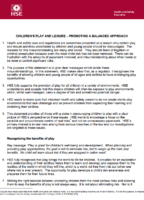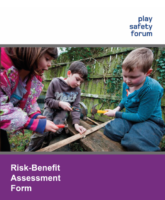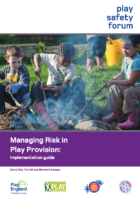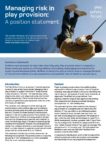
“One thing kids never lack is imagination to invent their own games with the simplest of props. Obviously if a child is playing with a jagged edge on a tin container there is a risk of injury, but we would hope parents manage that risk. HSE has always encouraged children to learn through play, whether climbing trees, painting with their hands or throwing stones into a lake, we want children to enjoy life and all the experiences it brings.”
Health & Safety Executive
Positive approach to risk in play – HSE Statement
Play Scotland is a member of the UK Play Safety Forum (PSF) which promotes the wellbeing of children and young people through ensuring a balance between safety, risk and challenge in respect of play and leisure provision.
The Health and Safety Executive (HSE) worked with the PSF to produce Children’s Play & Leisure Promoting a Balanced Approach. This a joint high-level statement that gives clear messages about risk benefit assessments. HSE fully endorses these principles:
- Play is important for children’s well-being and development
- When planning and providing play opportunities, the goal is not to eliminate risk, but to weigh up the risks and benefits
- Those providing play opportunities should focus on controlling the real risks, while securing or increasing the benefits.
Additionally, the Playwork Principles underpin playwork practice for the sector and establish the professional and ethical framework for playwork and as such must be regarded as a whole. They are based on the recognition that children and young people’s capacity for positive development will be enhanced if given access to the broadest range of environments and play opportunities.
Positive approach to risk in play – Care Inspectorate Statement
The Care Inspectorate has shown its support for nurseries, childminders and other early years care services that take a positive approach to risk, by setting out its position on regulating for risk in play. Their position statement was launched with the support of Play Scotland at their event Playing with risk: embracing the benefits with positive regulation, held in January 2016.
The Care Inspectorate’s position statement
“The Care Inspectorate supports care service providers taking a positive approach to risk in order to achieve the best outcomes for children. This means moving away from a traditional deficit model that takes a risk-averse approach, which can unnecessarily restrict children’s experiences attending registered services, to a more holistic risk-benefit model. For example, we encourage services to use risk assessment to support children to enjoy potentially hazardous activities such as woodwork using real tools, exploring nature and playing in the mud and rain. We do not expect written risk assessments to be carried out for daily play activities.”
Play Scotland supports risk benefit assessments
Cherie Morgan, Play Development Officer, Play Scotland says:
“We want to see a common sense approach to risk in play, where practitioners weigh up the benefits, as well as the risks involved with activities. The opportunity to face challenges in a supportive environment helps children and young people learn to assess and manage risk for themselves, and this is vitally important for their development. We’re delighted to have worked with the Care Inspectorate to develop this important message and to highlight this approach to those who are responsible for the day to day care of children.”
Ministerial support
Aileen Campbell MSP and Minister for Children and Young People supports this new approach with the following statement.
“In June 2013 the Scottish Government published the Play Strategy for Scotland, which seeks to improve the play experiences of all children and young people, including those with disabilities or from disadvantaged backgrounds. The Strategy aims to ensure all children and young people can access play opportunities in a range of settings which offer variety, adventure and challenge. They must be able to play freely and safely while learning to manage risks and make choices about where, how and when they play according to their age, stage, ability and preference.
“A huge part of this is giving regulated services the confidence to provide good quality, challenging play opportunities for children in their care. Real life experiences for children cannot be free of risk; from the very beginning children learn from trial and error, falling and getting up, testing their own boundaries and this enables them to develop their own coping strategies and resilience.
“It is important too that children with additional support needs also have the chance to experience challenging play – and that quality play opportunities are offered to all children, according to their needs and preferences.
“Myth busting in terms of what ‘safe care’ is for our children is also important. Scotland’s children deserve to be cared for in a loving, nurturing environment that includes hugs and the comfort of touch, which is even more important now that children are in care environments from a younger age and for longer periods of time.
“I am delighted that the Care Inspectorate is supporting care service providers to adopt a more holistic risk-benefit model to help them achieve the best outcomes for children. This positive approach to risk emphasises confidence in providers using their professional judgement to support, nurture and challenge the children and young people in their care.”
Risk Benefit Assessment Form
Risk-Benefit Assessment is an easy-to-use method to support play providers to balance the benefits of an activity with any inherent risk, taking into account the risks while recognising the benefits to children and young people of challenging play experiences.
It will be invaluable for all those who manage spaces and settings in which children play, and for those involved in designing and maintaining them. The initiative is supported by the Health and Safety Executive (HSE) and the UK Government.










